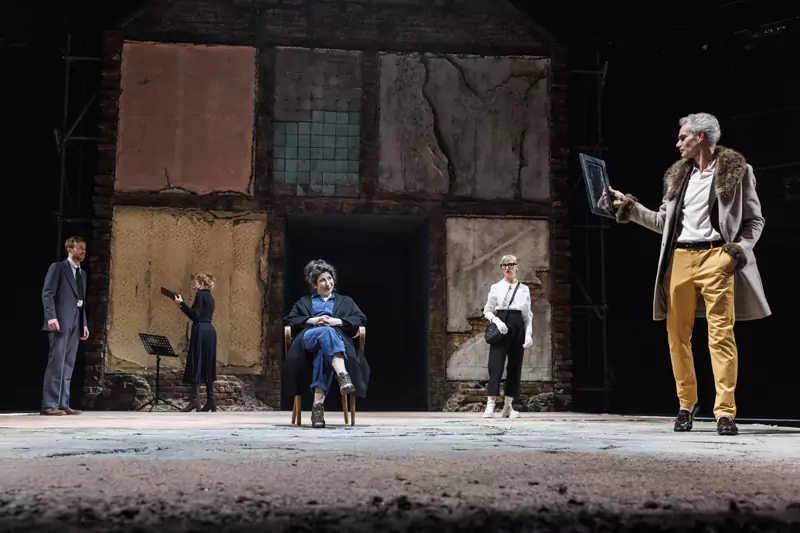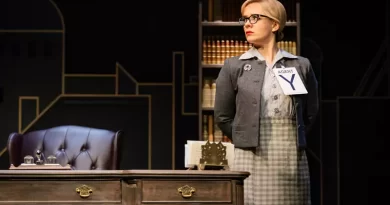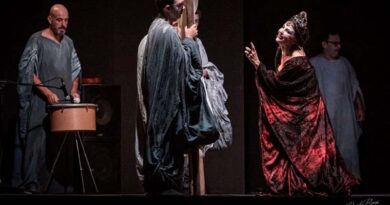“Nachtland” at the Young Vic
Neil Dowden on the South Bank
1 March 2024
German playwright Marius von Mayenburg’s 2022 work Nachtland (here given its UK premiere in an English translation by Maja Zade) is a deliberately discomfiting experience. ‘Nachtland’ is an invented German word suggesting eternal darkness, but although the play deals with the legacy of that country’s Nazi past as well as dysfunctional family relationships, its meta-theatrical style and awkward humour provoke an ambivalent response.

The ensemble.
Photo credit: Elllie Kurtzz.
As the audience enters the auditorium, the cast are already on stage cleaning up the ramshackle contents of a decaying house. The actors directly address us, though there is an argument about who has control of the narrative. Nicola tells us that they are clearing out the home of “my” – corrected to “our” by her brother Philipp – father after his recent death. She seems unemotionally pragmatic, whereas he struggles to accept what has happened in his grief.
When they find an ordinary old watercolour of a church wrapped in brown paper in the attic, Nicola at first wants to throw it out while Philipp wants to keep it – but when they notice that it is signed by “A. Hitler” all hell breaks loose. They are keen to find out if it’s valuable so that they can sell it, while Nicola’s complaisant husband Fabian is roped in but Philipp’s appalled Jewish wife Judith wants to burn it. When art historian Evamaria (whose grandfather was the Führer’s curator) confirms excitedly that it is indeed “a genuine Hitler”, rich playboy and neo-Nazi collector Kahl makes them an offer they can’t – or won’t – refuse.
The play shows the corrosive effect of this Nazi artefact. Nicola and Philipp rewrite their family history to give the painting a provenance that ups its price, claiming their opera singer grandmother was the mistress of Martin Bormann, Hitler’s private secretary. Fabian ends up in hospital after being literally poisoned by the picture when he cuts his thumb on a nail in its frame. Judith – whose protesting voice is increasingly ignored and who is even offered as added value in the transaction – sinisterly disappears into the bathroom. A clever twist at the end puts everything in a new perspective.

The ensemble.
Photo credit: Elllie Kurtzz.
Nachtland is a strange mixture of heavy-handed social satire that verges into farce, absurdist comedy, and Brechtian alienation that involves breaking the fourth wall. Because of the dark subject matter, it’s an unsettling and disturbing piece that challenges our expectations – but with its stereotypical portraits of Nazi sympathizers, it ends up as a frustratingly underwhelming experience.
That’s a shame as the play touches on important themes such as confronting the legacy of family and nation, barbed marital relations, and the commercialization of the art market – there is even a brief controversial mention of Israel’s treatment of Palestinians. No doubt it has a particular resonance in Germany with deeply concerning echoes of its Nazi history in the resurgence of the far right in the shape of the AfD party and resurgence of antisemitism – though of course that is by no means confined to Germany.
One of Germany’s top contemporary dramatists, Von Mayenburg may not be particularly well known in this country but his plays have been staged by the likes of the Royal Court, Arcola, Ustinov Studio, and the Young Vic (which produced Fireface in 2012). For over 20 years, he has been working as a playwright, dramaturg, and director at the Schaubühne Theatre in Berlin where he has formed a close collaboration with artistic director Thomas Ostermeier (whose An Enemy of the People is currently playing in the West End).
This edgy production by Patrick Marber (who last year won a Tony Award for directing Tom Stoppard’s Leopoldstadt about a Jewish family living in Vienna in the first half of the 20th century, including the impact of the Holocaust) certainly keeps us guessing, with members of the cast approaching the stage from different parts of the auditorium, while at times operatic music heightens the tone. Anna Fleischle’s design shows a dilapidated brick building with boarded-up windows, as well as a cracked concrete floor, and Richard Howell’s expressionist lighting spotlights individuals when they are the centre of attention.
The cast are excellent. Dorothy Myer-Bennett (who has replaced Romola Garai in the run) is the domineering, hard-nosed Nicola who has no time for moral scruples or false sentimentality. She if offset by John Heffernan’s weak-willed, passive Philipp whose seeming liberal beliefs don’t go very deep (as rather clumsily signposted by the “Faust” T-shirt he is wearing). Jenna Augen’s Judith is incredulous to start with and then becomes increasingly horrified when it seems the antisemitism of the past is rearing its ugly head again. Gunnar Cauthery is the unfortunate Fabian whose arm becomes locked in a “Seig Heil” gesture due to tetanus. Jane Horrocks is the chillingly amoral art expert Evamaria after maximum commission, while Angus Wright plays the kinky club dancer Kahl who fetishizes Jewish women as he does Nazi memorabilia.









